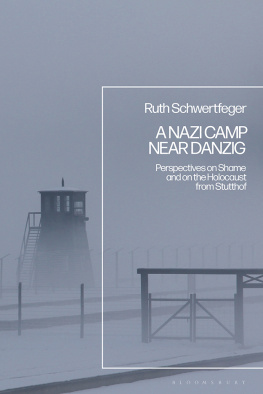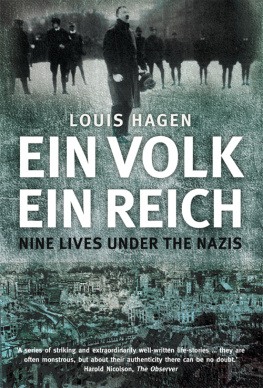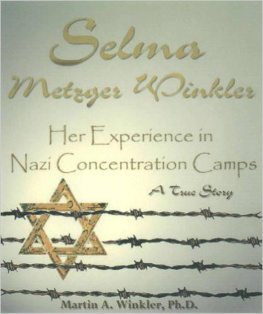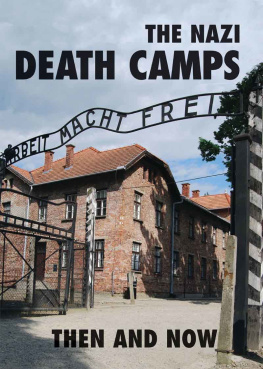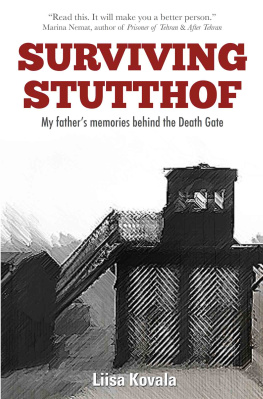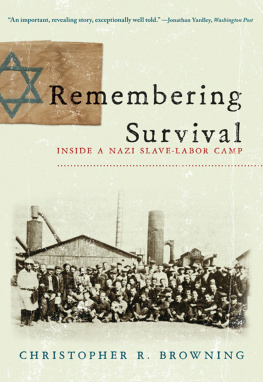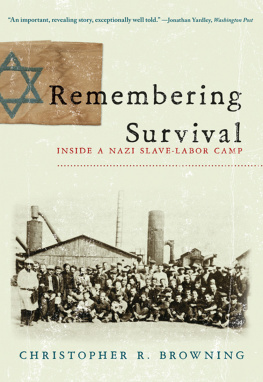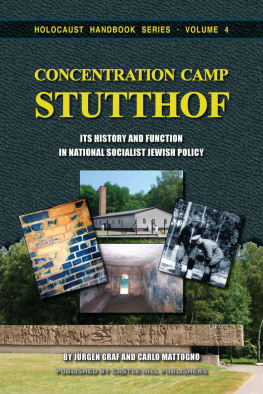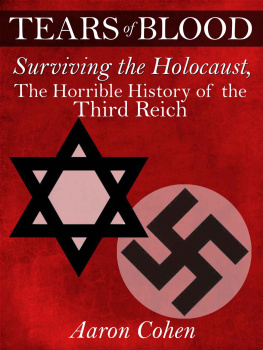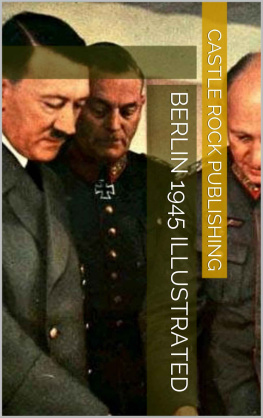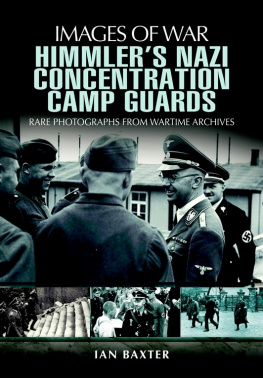A Nazi Camp near Danzig
A Nazi Camp near Danzig
Perspectives on Shame and on the Holocaust from Stutthof
Ruth Schwertfeger

This book is lovingly dedicated to Alexandra Schwertfeger Solanki and Caroline Hambly Schwertfeger, the mothers of my grandchildren. May they pass on to these children the history of Stutthof, and especially the memory of Stutthofs mothers and children, in the spirit of Ecclesiastes 3: 15(b): And God requires an account of what is past. (NIV)
Contents
I first visited Stutthof eight years ago, accompanied by a local Methodist minister who, when he heard about my research on German Jewish literature, knew that the museum and archives of Stutthof would be of great interest to me. I left Stutthof that day with copies of documents mostly in German that became foundational to the research that I pursued during the years that followed. First of all, I want to acknowledge my gratitude to Piotr Tarnoski, the Director of the Stutthof Museum, for extending permission and the privileges of access to the archives from the start of this research project. The Head Archivist, Dr. Danuta Drywa, has given me unfailing support during each phase of the research and writing of the book. I have drawn extensively from her scholarship on Stutthof and her knowledge of Danzig/Gdask and surrounding areas. Aleksandra Gluba-Pieprz provided invaluable help as a research assistant in Poland. I want to thank her for her hard work and scholarly interest in the project.
In my home department of Foreign Languages and Literature at the University of Wisconsin-Milwaukee, I would like to thank Professor Michael Miko and Dr. Boena Tieszen for their encouragement and support. Professor Miko read several versions of the manuscript and recommended secondary Polish sources. Dr. Tieszen translated all the Polish quotations used in the book into English and also helped me understand their context. Colleagues in the History Department at UW-Milwaukee made themselves available to me and answered my questions. I want to thank Professors Winson Chu and Neal Pease, both of them nationally recognized scholars in Polish History for their patience with someone outside their discipline. My colleagues at the Stahl Center for Jewish Studies could not have been more encouraging. I extend my thanks to Professor Joel Berkowitz, and to Dr. Rachel Baum who was always available to discuss my ideas for including Gnter Grass in my project.
In 2019, I was invited to present my research at a workshop in PolandRecovering Forgotten Historywhich exposed my work to the scrutiny of Polish colleagues engaged in comparable academic research. Three of these colleagues read the full manuscript and offered their commentary before the whole group of authors and press editors. They followed up with detailed written reviews which were extremely helpful and have greatly influenced the final version of the book. I also extend my thanks to Professor Marek Wierzbicki who also read the full manuscript and wrote a detailed commentary with information about Pomerania that enriched my understanding of its history. I would like to thank Richard Ratzlaff for recommending me to be a participant in the workshop. Anonymous readershistorianson this continent and in the UK have been a vital source of correction, if not always of encouragement. I am grateful for and humbled by their expertise. I have secretly hoped that I get to review their work when they write about literature. I extend my thanks to the archivists at USHMM who were always courteous and patient with my requests for material. The digital age has certainly made research easier and accessible to all the archives that I have used, as far away as the Arolsen Archives, the Mauthausen Archives, and the Yad Vashem. I am grateful for the information and the documents that their archivists sent me.
I am deeply indebted to the contribution of Michael Zore whose technological and research skills have helped at every stage of preparing the manuscript. Others, like Professors Andrew Porter and Professor Emeritus Richard Monti from Classics and Professor Jonathan Wipplinger from German, have been there at crucial junctures when I simply needed to talk about my research plans. Their questions and comments always enriched and challenged my thinking. I am sad that two other people who used to fill that role are no longer with usDr. Alfred Bader and Father Michael Fountain. I miss the stimulating conversations.
I owe special gratitude to Rhodri Mogford, my editor at Bloomsbury Press, for his unstinting support for this project and his professional expertise as an editor. It has been a pleasure to work with him.
Family members and close friends have given me moral and spiritual support in the writing of this book and preparing it for publication. I single out for special thanks to my husband Fred who accompanied me on all my research trips and has supported me at every level. The home of my brother, Alex Crawford, in Northern Ireland has always been open to me as a retreat and a quiet place to write. I give special thanks to those who prayed for me, especially when a car accident laid me aside right in the middle of my research. Finally, I want to thank Rabbi Marc Berkson for many years of friendship. Before Marcs wife, Debbie, died she discovered that her mother, Edith Carter, had also survived Stutthof. We knew she had survived both Theresienstadt and Auschwitz but Stutthof? I also knew Debbies mother and, in fact, dedicated my book on Theresienstadt to her and to the memory of my own mother. Surely it is not too late to acknowledge that my friend, Edith Carter, was also in Stutthof and that she kept her suffering silently to herself for all those years.
AK
Armia Krajowa | Home Army |
Amt D
Branch D
Office D | In 1942, the IKL became known simply as Amt D (Office D) of the consolidated main office of WVHA |
| Arbeitererziehungslager | A corrective labor camp |
| Arolsen Archives (ITS) Archives | The Arolsen Archives are an international center on Nazi persecution with the worlds most comprehensive archive on the victims and survivors of National Socialism, with information on about 17.5 million people, and is part of UNESCOs Memory of the World |
| Aufseherin | Female guard |
| Block | Barrack. Sometimes used to refer to the prisoners in that barrack |
| Blocklterster | Block or Barrack Elder |
| Blockfhrer | The SS man in charge of one barrack or block |
| Bund Deutscher Mdel (BDM) | The German Girls League was the female branch of the Hitler Youth |
DAW
Deutsche Ausrstungswerke | German Equipment Works |
DC
Deutsche Christen | German Christians |
DESt
Deutsche Erd- und Steinwerke GmbH | German Brick and Tile Works, also known as the German Earth and Stone Works |
DPA
Deutsche Presse Agentur | German News Agency |
| die bekennende Kirche | Confessing Church |
DVL
die deutsche Volksliste | German National Registry or National Identity Registry |
| die zentrale Stelle der Landesjustizverwaltungen | The Central Office of the State Justice Administrations for the Investigation of National Socialist Crimes, established in 1958 |
| Erziehungslager | A re-education camp where prisoners were indoctrinated through labor |
| Fhrerprinzip | The principle of absolute obedience to the Fhrer |
Gau
Gaue (plural) | Nazi Party administrative region |
Next page
